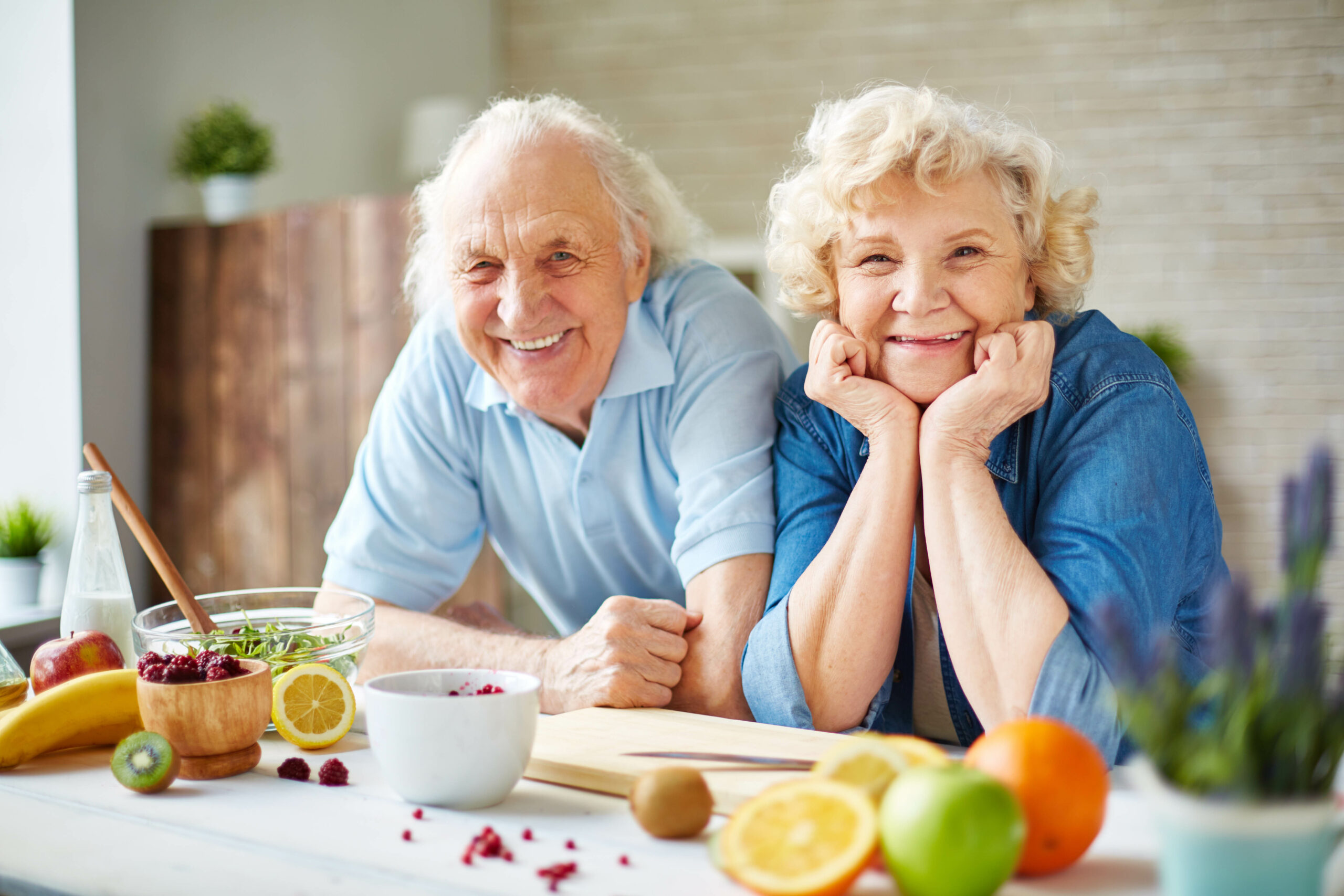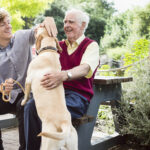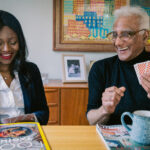Ageing doesn’t have to mean mental and physical decline. There are plenty of practical tips that can help you or your loved ones stay happy and healthy for longer.
Diet
As we age, our nutritional requirements change. The energy we need from food tends to decrease as we lead a less active lifestyle. As a result, it’s important for older people to eat a nutrient rich diet, packing in the nutritional value needed to stay healthy, despite often eating less.
1. Eat more protein
Both men and women need to eat a more protein-dense diet as they get older, to ensure they meet their daily protein requirements.
The benefits of eating more protein have been long established. In fact, a recent study even suggests that older adults should eat double the protein RDA to successfully counteract sarcopenia – the gradual loss of muscle mass. Think lean meat, dairy, eggs and pulses.
2. Eat more fruit and veg
Eating a fruit and vegetable rich diet is important throughout life, but especially so in older age. Only 30% of those 65+ consume their minimum recommended 5-a-day, meaning that poor nutrition costs the NHS £6 billion every year and leads to 2.7 million avoidable annual deaths.
5 portions of fruit and vegetables is the recommended minimum, and governmental health bodies suggesting we follow in the footsteps of countries like France and Japan, who advise 10 and 17 pieces of fruit or veg respectively.
3. Boost your vitamin D
Vitamin D deficiency is one of the most common risk factors for older people, contributing to issues like osteoporosis, muscle weakness, diabetes, heart disease and general poor health.
Many foods contain Vitamin D naturally – oily fish is a particularly good source – or you should consider Vitamin D enriched foods, or supplementation, particularly during the winter months.
4. Up your calcium intake
Calcium absorption decreases as we age, particularly in women, so upping the intake is incredibly important for reducing brittle fractures from osteoporosis. Studies are suggesting that the calcium Recommended Daily Amount (RDA) should be raised for older people, to help maintain bone strength.
5. Think folate or B-12
Vitamin B12 or Folate deficiency is common amongst older people, primarily due to decreasing absorption rates and decreased food intake. Foods containing B12 include:
- Meat
- Poultry
- Dairy
- Eggs
But some find a supplement is the best option, with the Institute of Medicine recommending that those aged 50 or older get their B12 from a supplement or synthetically fortified food product, as naturally occurring B12 is often more difficult to absorb.
6. Iron is critical
Getting the right amount of iron is a balancing act – too little, and anaemia and infections beckon; too much can cause harmful side effects such as vomiting and abdominal pain.
Most sources recommend older people don’t take an iron supplement because of the side-effects of exceeding the iron tolerance limit, instead, they recommend a diet packed with iron-rich foods such as green leafy vegetables, brown rice, fish and red meat. If you’re in any doubt, consult your GP.
7. Avoid sugar
Sugar ages you on the inside and out. Not only is sugar bad for your health but it’s bad for your skin too. When the body processes sugar, glycation occurs, creating harmful molecules that damage the proteins which keep your skin springy and firm.
With increased sugar intake diabetes becomes a concern, and diabetes can lead to:
- Cardiocascular disease
- Kidney disease
- Eye disease
Along with a myriad of other complications.
8. Limit salt intake
As with sugar, the negative effects of excessive salt intake are well documented. It causes high blood pressure, which in turn can cause cardiovascular disease, leading to:
- Strokes
- Heart attacks
- Heart failure
Blood pressure increases with age, as does salt sensitivity, so it’s especially important that older people limit their salt intake.
9. Get enough water
It’s been proven that the sensation of thirst decreases with age, as the mechanism in the body that detects lack of water, loses sensitivity. As a result, older people are at increased risk of dehydration, which has a big impact on physical and mental health.
Solve the problem by filling a large jug of water and keeping it somewhere visible and easily accessible, to act as a reminder to keep drinking regularly.
10. Moderate your alcohol intake
Many of us enjoy a drink, but it’s important to moderate alcohol consumption, especially with age. As our bodies become less proficient at breaking down alcohol, we’re more sensitive to its effects. Drunkenness can cause dizziness, lost balance and slow reactions, which in turn can lead to falls – so the key is moderation.
11. Plan your meals
Creating a weekly meal plan allows you to plan how you’re going to meet nutritional guidelines. Studies have shown that self-neglect is the most prevalent form of elder abuse, so take steps to look after yourself. If you struggle to get to the shops, trying buying your shopping online. If you struggle to prepare ingredients, try services like Mindful Chef. If making food at all is a challenge, have a look at Shared meals and Meals on wheels.
Mobility and exercise
Keeping active as you age can help you stay physically and mentally healthy and help you retain your independence. Adults over 65 are the most sedentary age group, spending an average of 10 hours or more per day, sitting or lying down. This comes with a price, with these adults seeing a higher rate of injury, disease and ultimately, early death.
12. Find age appropriate alternatives
Why does exercise drop off so suddenly in older age? Certainly, in some cases physical or mental decline makes exercise difficult, but it’s often previously active adults who, when favourite activities become unfeasible, don’t make alternative plans.
Previously avid tennis players, for example, could be looking ahead to golf. Not being able to pound the pavements or hit the gym shouldn’t be an excuse not to stay active as you get older. Any activity that raises your heart rate counts, from mowing the lawn to walking to the shops.
13. Try swimming
Swimming is an incredible exercise for the elderly. As it’s a low impact sport, swimming is accessible for almost everyone and has been shown to reduce risk of falling by a third.
14. Yoga
Staying limber is important as you get older, and yoga significantly improves flexibility. Researchers at the Oregon Health & Science University found yoga helps relieve the discomfort of chronic conditions such as arthritis and fibromyalgia too, while increasing strength and balance.
15. Strengthen your core
Comprising muscles across your stomach, back, hips and pelvis, having a strong core improves movement, balance, coordination and posture. There are plenty of core strengthening exercises designed for older adults, shown to increase strength by 30% and functional performance by 23%.
16. Improve your posture
Posture is a major indication of mobility, allowing you to retain independence as you get older. As your body adapts, poor posture can lead to ‘postural pain syndrome’, causing your muscles to shorten and weaken.
There are many simple daily exercises elderly people can do to improve both sitting and standing posture.
17. Weight-bearing exercise
Osteoporosis is common amongst older people, the by-product of this is the ‘hump’ many older people develop, as vertebra in the spine fracture. Weight-bearing exercise, including anything where your feet and legs bear the weight of your body, helps improve bone density in order to combat osteoporosis.
Medical
While it’s true that our susceptibility to physical and mental illness or disease increases as we age, it’s not an inevitability. With life expectancy increasing year on year, good medical practice can help ensure that the ten, twenty, even thirty years post-retirement are happy and healthy ones.
18. Quit smoking
This should go without saying. Smoking is one of the worst things you can do to your body at any age, but once you get past 60 the likelihood of smoking-related mortality increases massively. The good news is that people who quit smoking over the age of 60 are far more likely to succeed.
19. Have regular eye checks
Age-related vision problems are common, but there are steps you can take to ensure your eye health for longer. As well as diet and exercise, it’s critical that older people have regular eye checks to make sure everything is as it should be.
There are also medical gels you can buy that provide your eyes with nutrients like Omega-3 and Lutein, which can help keep your central vision better for longer.
20. Have regular hearing checks
Hearing loss is one of the most common problems affecting the elderly. It can be embarrassing, frustrating and even dangerous, so the most important thing is to have regular check-ups.
There are various treatments, devices and aids that can help if you suffer from hearing loss – your doctor can ascertain which are best for you.
21. Go to the dentist regularly
Does anyone like the dentist? I know, it’s easy to keep putting that dentist appointment off, but regular check ups are more important for the elderly.
There are various dental problems elderly people are more likely to face, including:
- Receding gums
- Sensitive teeth
- Tooth loss
- Bridge or denture maintenance
- Dry mouth
By keeping regular appointments with your dentist, you can help to keep your mouth in tip-top shape, before anything more serious develops.
22. Manage your medication
As we get older, it’s normal to have a wider array of chronic conditions that are managed by medication – but 55% of the elderly are “non-compliant” with the doctor’s orders.
Not taking these medications correctly can have a serious impact on health – around 200,000 older adults wind up in hospital annually as a result of mismanaged medication. There are many solutions to help: pill organisers, larger print prescription labels and medication alarms, to name but a few.
23. Have a ‘full MOT’
One of the best ways elderly people can ensure they stay happy and healthy for longer is to have preventative tests. This means that any potential problems can be identified before they become a real issue.
Some examples of preventative tests you should consider are:
- Blood pressure tests
- Cholesterol tests
- Cancer screenings
- Bone mineral density scans
- Diabetes scans
Talk to your doctor about the screenings available and suitable for you – don’t want until something goes wrong.
24. Don’t neglect vaccinations
It might be that you could once get over a bout of flu with lemsip, olbas oil, and sleep. But as we get older our bodies tend to need a wider range of vaccinations to stay healthy. Common recommended vaccines for older adults include Influenza (Flu), PPV and Shingles.
Get in touch with your doctor to discuss the vaccines available. No one loves having an injection, but they can prevent the onset of life threatening conditions.
In the home
As the ageing process advances, help may be necessary to manage day-to-day. Staying at home is the better option for most, in fact, 90% of older adults would prefer to stay in their own home. However, there are often modifications that can be made and steps that should be taken to ensure the home is safe to continue living in.
25. Focus on mobility
Mobility often becomes more challenging as we age, and it’s important that an elderly person can still get around their own home. Appropriate elderly mobility modifications might include installing wheelchair ramps, widening doorways or stair-lift installation.
Thinking about these things now is critical, as an elderly person needs to be able to move around their home quickly in the case of an emergency.
26. Improve lighting
Ensuring proper lighting in the home is important for both mental and physical health, and is a good preventative when it comes to trips and falls too. As we age, we experience degeneration in the eyes, the pupils decrease in size and the lens inside the eye becomes thicker, meaning less light reaches the back of the eye.
We become less able to register changes in light and dark, which can impact our sleeping patterns and circadian rhythms. Many older people will also have a limited amount of natural sunlight, which can have a detrimental health impact.
27. Eliminate trip hazards
Falls are the most common cause of injury-related death in those over 75. We become increasingly likely to fall as we age, as our balance, vision and muscle strength becomes compromised.
Preventing falls can be as simple as ensuring proper lighting, securing rugs or carpets and ensuring storage areas are safe. Making sure you can properly move around in your home is also important, including easy access to bathrooms.
28. Assess your bedroom
There are a number of things you can do in the bedroom to make your life easier and safer, depending on your needs and limitations. Adjustable beds can be a particularly useful product, helping you get in and out when you want to.
If you have difficulty dressing or undressing there are various dressing aids to consider, as well as special-function clothes such as mastectomy bras, compression hosiery or osteoporosis protectors.
Other useful products include vibrating, flashing or talking alarm clocks, which can help you manage vision or hearing difficulties.
29. Assess your bathroom
There are many products available that can make using the bathroom easier for elderly people. From assisted toilets to safety plugs, walk-in baths to shower seats, there are lots of ways to adapt your bathroom to meet your needs.
Many people also choose to install a downstairs bathroom if they don’t have one, making it easier to access. You might also consider converting your bathroom into a wet room.
30. Assess your sitting room
Feeling safe, relaxed and comfortable is critical to your happiness and health, whether that means sitting and enjoying a good book, or watching your favourite TV show.
A specialist armchair could make it easier to sit down and get back up, and can elevate your feet if you get swollen ankles. Another great product to improve blood circulation is the vibrating footpad, helping reduce inflammation.
You can also get specialist large print books and specially designed large-button TV remotes if your vision isn’t what it used to be.
31. Assess your kitchen
People aged 65+ are 250% more likely to die in a kitchen fire than any other age group, so ensuring elderly kitchen safety is critical. There’s also the risk of falls, reaching for high or low cupboards, and the risk of food poisoning from not properly cooking food through.
There are many common sense things you can do to ensure safety – make sure everything is stored within reach, replace glass items and so on. There are also products you can invest in: anti-scald devices to moderate tap temperature (good for the bathroom too), Liquid level indicators and automatic shut-off devices, to name a few.
32. Fire proof your home
Fires are dangerous at the best of times, but especially so for older people who may have reduced mobility or weakened senses, limiting their ability to react quickly.
You might consider sleeping downstairs, to make exit easier in the case of a fire. It’s also important to take appropriate fire safety preventative measures; installing and regularly checking fire alarms, and fire proofing materials.
There are specialist fire alarms that vibrate, flash and have a louder alarm for those with reduced hearing or sight.
33. Adapt your front door
Many older people will find it difficult to answer the door quickly, and are also concerned about the safety of doing so. There are various options available, from a door-entry intercom, to a video entry phone (these often allow you to open the door without getting up from your chair). At the minimum, installing a simple door chain can give you the peace of mind that opening the door doesn’t mean letting a stranger in.
Door safety is an often forgotten, but absolutely critical, elderly care tip. According to UK trading standards, 85% of doorstep scams happen to those aged over 65.
34. Get an elderly home sensor
Home sensors can give you and your loved ones peace of mind. Sensor systems can go around the home and ensure you’re up and about, without relying on video. Just Checking is a good example.
Another similar product is the Age UK personal alarm service, which allows the wearer to press a simple button if they need help and friends, family, or the emergency services are immediately alerted.
35. Consider home care
Home care can be a fantastic way to help you stay happy and healthy, without sacrificing your independence. A home carer can provide support that is as light or intense as you need, ranging from weekly pop-ins, to daily support, to live-in care.
One of the biggest advantages of home care is that is can completely adapt to your needs over time, which also means that it’s much cheaper than a care home. If you’re looking for home care, check out the HomeTouch community.
On the road
Driving is one of the issues most likely to elicit arguments between older people and well-meaning family members. Seniors are generally reluctant to give up their keys, but there usually comes a point that driving is no longer safe.
Giving up driving doesn’t have to be the traumatic experience most of us assume it will be. It simply requires a shift in focus, because there are plenty of alternative options.
Here are some tips to help you get about safely, whether by car or by an alternative.
36. Take a mature driving class
Old age doesn’t always have to mean giving up your license – as long as you mitigate the risks of an accident by honing and refreshing your driving skills.
A mature driving class will cover areas such as road safety, traffic safety, techniques to compensate for declining reaction times, hearing loss and vision change, and much more. Many courses then offer you a discount on your car insurance too.
37. Consider CarFit
CarFit is an educational program inviting older people to bring their cars in for ergonomic adjustment, as well as bespoke recommendations to improve safety, such as mirror add-ons or arthritis-optimised keys.
38. Try a mobility scooter
For travelling shorter distances, a mobility scooter could be an ideal option. Many are able to travel on roads, and can be ideal for popping to the local shop or meeting friends for a coffee.
Some people are eligible to buy a scooter through the Motability Scheme too.
39. Dial a ride
The Dial-a-Ride is a local scheme that operates across the country, offering door-to-door transport services.
Simply register with the scheme and you can book a journey easily – they’ll pick you up and drop you off at your own home. Search the Internet for a local Dial-a-Ride to get started.
40. Use community transport schemes
Each area will have different community transport schemes to help elderly people get about safely. These might include everything from shopping transport to car share groups.
The Royal Voluntary Service also provides lifts to elderly people all around the country.
41. Take advantage of public transport
Public transport is one of the easiest, most efficient and least expensive ways for elderly people to get around without a car.
You can apply for a number of senior discounts too, such as an Older Person’s bus pass – giving you free off-peak travel across England – and a Senior Railcard – giving you 1/3 off rail fares.
Mental Health
When we think of ageing, we often think of the associated physical symptoms but it’s important to take care of your mental health too.
While many older people do suffers from depression, dementia, or medication interactions that cause symptoms of mental illness, these aren’t inevitable. There are many things older people can do to maintain their mental health, staying sharp, sprightly and strong as you age.
42. Confide in Someone
Managing mental health difficulties is easier if we have someone to confide in. You could try talking to friends and family, or you could talk to a professional. This might mean a counsellor, or it might mean a financial advisor – depending on your fears and concerns.
With mental health, it really is true to say that a problem shared is a problem halved. It’s nothing to be ashamed of – fear and worry can affect all of us, and 1 in 5 older people suffer from depression.
43. Find your Sense of Purpose
Many people feel bereft when they retire – as if their sense of meaning has disintegrated.
Rediscover your purpose by taking some time to assess what it was about your job that made you feel that way. Was it that you felt valued? Was it financial security? Was it the social aspect of work? Did it contribute to your self-esteem?
Actively seek out other activities that can nurture these feelings. Many older people find fulfilment in volunteering, helping out in their local community.
44. Combat Memory Loss
Lots of older people do struggle with declining memory, but there are plenty of brain exercises that can help you stay sharp, from Suduko or crosswords to chess or bridge. Actively engage yourself in activities that involve strategic thinking, and make a habit of learning unfamiliar or mentally challenging things.
There are also Memory Clinics throughout the UK that your GP can refer you to, or you can attend privately. Founder of HomeTouch, Dr Jamie Wilson, used to work at one such memory clinic in London.
45. Interact Every Day
Did you know that loneliness is worse for your health than smoking? Risk of loneliness increases in the elderly, as many older people are more isolated, less able to get around, and have diminished social networks.
It’s absolutely critical to interact with people every day, whether that means calling a friend or relative or chatting to the neighbour. Be proactive in making new friends, and seek out opportunities to get involved with friends, family or within the local community.
46. Seek a Companion
Many older people get a lot of pleasure out of having a companion carer. A companion carer provides a vital social link, someone to share tea, stories and laughter with – either inside or outside the home.
Another option is community companionship services that aim to help elderly people feel more connected. Casserole Club is an example that offers meals and company to isolated elderly people.
Legal and Financial
Sometimes as we get older our mental or physical ability to manage our own affairs confidently and securely is compromised. Fears over the future can weigh heavily on us– resolving those fears is often as simple as following these legal and financial elderly care tips!
47. Assign a Lasting Power of Attorney
A lasting power of attorney is a person you’ve given the power to make decisions for you when you are no longer able to, physically or mentally.
There are two types of lasting power of attorney you should ascribe: property and financial affairs, and health and welfare. Contact a solicitor and they can help talk you through the process, ensure everything is properly set up and registered, and in your best interests.
48. Make Post-Life Arrangements
Setting out your last wishes now – even if your final days feel a long way away– offers huge peace of mind. It can make the aging process easier on both you and your loved ones, knowing that your final arrangements are exactly as you want them.
Drawing up a will is also important for legal reasons. If you pass away without a will (intestate) it creates a complex legal situation, and you risk any assets you have bypassing the hands of anyone you’d have wanted to have them.
49. Make a Financial Plan
Finances can be a stressful part of growing older. People are living longer; care costs are rising; and inflation means your money is decreasing in real-terms value.
It’s important to make a financial plan as early as possible, so you can plan for your needs over time. You might live for another 40 years after retirement so preparing now is critical.
50. Resolve unfinished business
One of the most significant things many older people worry about is passing on without settling old scores, laying old issues to rest – whatever you want to call it.
One of the most important things you can do for yourself is to address any unresolved issues with your loved ones.
There you have it. Our top 50 elderly care tips – helping older people stay happier and healthier as they age. The key takeaway is that old age doesn’t have to be synonymous with mental or physical decline. There are many things that you can do to make the most of your twilight years.




